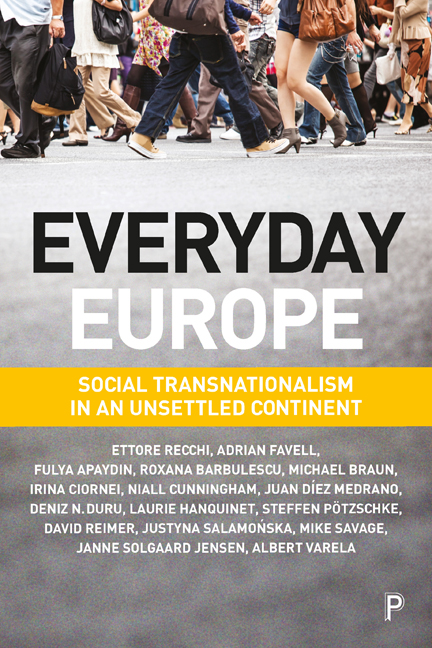Book contents
- Frontmatter
- Contents
- List of tables and figures
- Notes on contributors
- Acknowledgements
- Introduction: Social transnationalism in an unsettled continent
- one Cartographies of social transnationalism
- two The social structure of transnational practices
- three Cultural boundaries and transnational consumption patterns
- four Social transnationalism and supranational identifications
- five Explaining supranational solidarity
- six Narratives and varieties of everyday transnationalism
- seven Understanding Romanians’ cross-border mobility in Europe: movers, stayers and returnees
- eight Transnational Turkey: the everyday transnationalism and diversity of Turkish populations in Europe
- Epilogue Is social transnationalism fusing European societies into one?
- Methodological appendix
- Index
Introduction: Social transnationalism in an unsettled continent
Published online by Cambridge University Press: 19 April 2022
- Frontmatter
- Contents
- List of tables and figures
- Notes on contributors
- Acknowledgements
- Introduction: Social transnationalism in an unsettled continent
- one Cartographies of social transnationalism
- two The social structure of transnational practices
- three Cultural boundaries and transnational consumption patterns
- four Social transnationalism and supranational identifications
- five Explaining supranational solidarity
- six Narratives and varieties of everyday transnationalism
- seven Understanding Romanians’ cross-border mobility in Europe: movers, stayers and returnees
- eight Transnational Turkey: the everyday transnationalism and diversity of Turkish populations in Europe
- Epilogue Is social transnationalism fusing European societies into one?
- Methodological appendix
- Index
Summary
Social transnationalism amidst the Eurogloom
After more than fifty years of ‘ever closer union’, and thirty years on from the collapse of the Berlin Wall, Europe has become a continent of gloom. With the European Union and European political systems in crisis, the idea of further integration seems indefinitely stalled. The dissensual politics and populism that has gripped many core members of the European Union, and even threatens democracy itself in some, is said to be largely driven by repugnance to transformative ideas at the heart of the EU project: the notion of a borderless, convergent and united continent that has long been the vision of European political elites (Manow et al 2018; de Vries 2018). This Europe, built on the notion of macro-regional economic integration and the four freedoms of movement – of capital, goods, services and persons – is widely claimed to be at the root of social and spatial inequalities gnawing at the cohesion of European societies (Beckfield 2006; Fligstein 2008; Kriesi et al 2008; Fourcade et al 2013). And, accordingly, national populations appear to have a receding taste for the idealist political constructions of the politicians, bureaucrats and intellectuals who projected European society beyond the nation state (Goodhart 2017).
Since the global financial crisis of 2008, most popular commentary and scholarly analysis of the European project has come to echo this diagnosis. Its pessimism has appeared something that is seemingly unavoidable from any diagnosis which focuses on political dynamics or institutional and legal contexts. The dominant line of argument has been to emphasise the end of the ‘permissive consensus’ (Hooghe and Marks 2009): the quiet mode of European integration in which national populations allowed technocratic elites to build a supranational economic and political system as long as it satisfied the continent's need for peace and sustained economic growth. With the demise of the EU Constitution (2005), the Eurozone crisis over the economies of Southern Europe (from 2009) and then the British vote for ‘Brexit’ (2016), ‘Europe’ as a political construction has also been seen to be reversible.
- Type
- Chapter
- Information
- Everyday EuropeSocial Transnationalism in an Unsettled Continent, pp. 1 - 34Publisher: Bristol University PressPrint publication year: 2019



